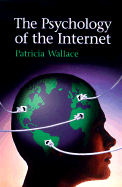Book contents
- Frontmatter
- Contents
- PREFACE TO THE PAPERBACK EDITION
- 1 THE INTERNET IN A PSYCHOLOGICAL CONTEXT
- 2 YOUR ONLINE PERSONA: THE PSYCHOLOGY OF IMPRESSION FORMATION
- 3 ONLINE MASKS AND MASQUERADES
- 4 GROUP DYNAMICS IN CYBERSPACE
- 5 INTERGROUP CONFLICT AND COOPERATION
- 6 FLAMING AND FIGHTING: THE PSYCHOLOGY OF AGGRESSION ON THE NET
- 7 LIKING AND LOVING ON THE NET: THE PSYCHOLOGY OF INTERPERSONAL ATTRACTION
- 8 PSYCHOLOGICAL ASPECTS OF INTERNET PORNOGRAPHY
- 9 THE INTERNET AS A TIME SINK
- 10 ALTRUISM ON THE NET: THE PSYCHOLOGY OF HELPING
- 11 GENDER ISSUES ON THE NET
- 12 NURTURING LIFE ON THE INTERNET
- Index
1 - THE INTERNET IN A PSYCHOLOGICAL CONTEXT
Published online by Cambridge University Press: 05 August 2012
- Frontmatter
- Contents
- PREFACE TO THE PAPERBACK EDITION
- 1 THE INTERNET IN A PSYCHOLOGICAL CONTEXT
- 2 YOUR ONLINE PERSONA: THE PSYCHOLOGY OF IMPRESSION FORMATION
- 3 ONLINE MASKS AND MASQUERADES
- 4 GROUP DYNAMICS IN CYBERSPACE
- 5 INTERGROUP CONFLICT AND COOPERATION
- 6 FLAMING AND FIGHTING: THE PSYCHOLOGY OF AGGRESSION ON THE NET
- 7 LIKING AND LOVING ON THE NET: THE PSYCHOLOGY OF INTERPERSONAL ATTRACTION
- 8 PSYCHOLOGICAL ASPECTS OF INTERNET PORNOGRAPHY
- 9 THE INTERNET AS A TIME SINK
- 10 ALTRUISM ON THE NET: THE PSYCHOLOGY OF HELPING
- 11 GENDER ISSUES ON THE NET
- 12 NURTURING LIFE ON THE INTERNET
- Index
Summary
From almost total obscurity, the Internet swiftly leapt into our lives. Once an arcane communication medium for academics and researchers, it now sustains almost any human activity you can imagine, from shopping to sex, from research to rebellion. We use it to keep in touch with friends and coworkers, search for bargains, conduct research, exchange information, meet strangers, hatch conspiracies, and even – as I recently learned – talk to animals. Koko, the mountain gorilla who has been learning American Sign Language from Penny Patterson for more than 20 years, has now participated in live Internet chats. People from all over the world logged into the chat room to ask questions and hear Koko's views on motherhood, pets, food preferences, friendship, love, and the future. She was not in the best mood, having just had a tiff with her mate, Ndume, and she shared her annoyance with the crowd by referring to him derisively as toilet, which is her word for bad.
The Internet explosion happened so rapidly that we have not had much time to step back from the medium and look at it more systematically, as a new environment that can have potent effects on our behavior. It is a place where we humans are acting and interacting rather strangely at times. Sometimes its effects seem to be quite positive, but sometimes, we do things online that we might never do in any other environment, and that we regret later.
- Type
- Chapter
- Information
- The Psychology of the Internet , pp. 1 - 13Publisher: Cambridge University PressPrint publication year: 1999



